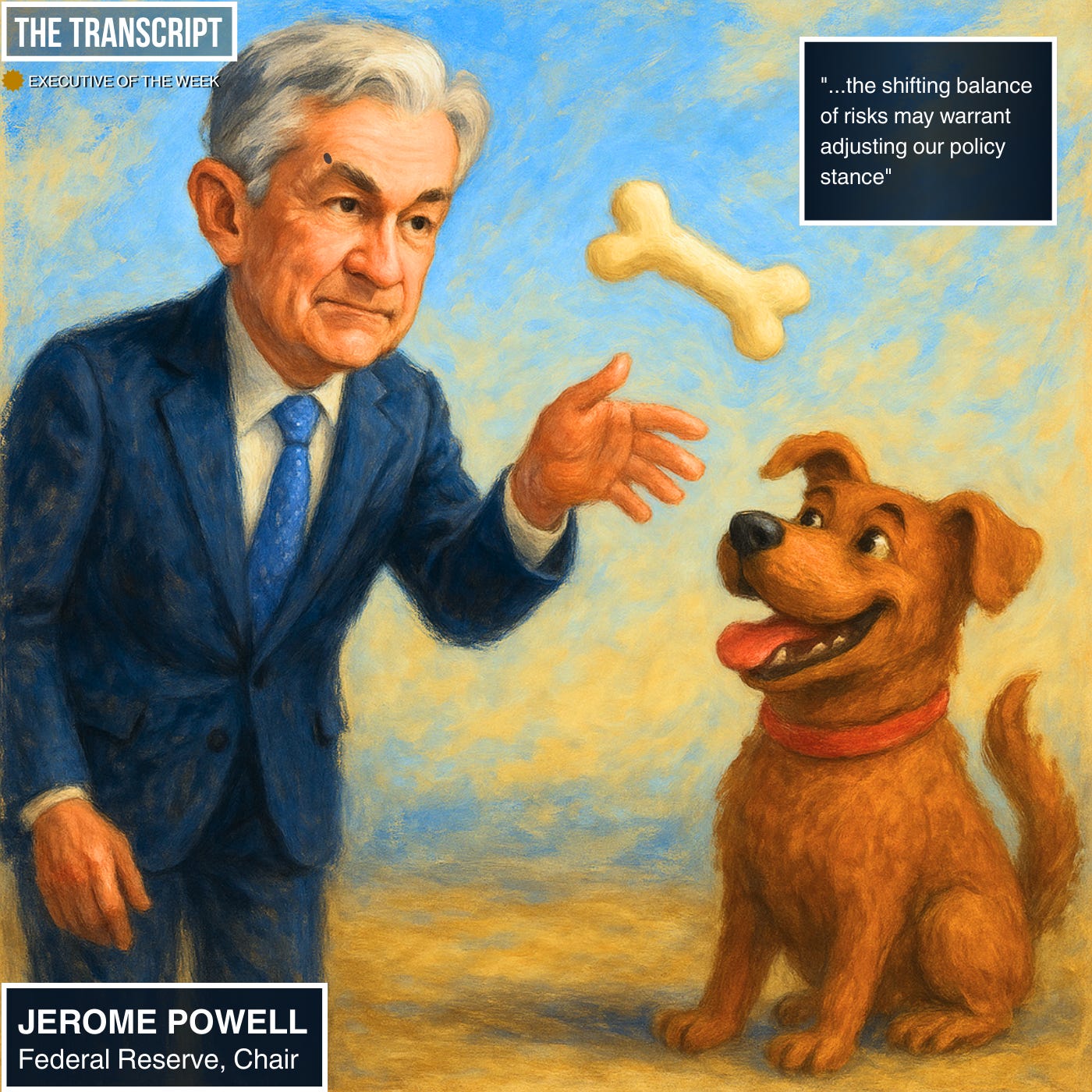Throwing a Bone
Powell: The shifting balance of risks may warrant adjusting our policy stance
Summary: Jerome Powell threw markets (and Trump) a bone by saying that a change in policy stance "may [be] warranted." It wasn't an emphatic endorsement of lower rates, but it was a signal that he may be softening his position. Other Fed members said that they want to see more data. The September unemployment report will probably be critical, but slightly lower rates probably won't change much anyway.
Editor’s Note: We have reserved the sections after Macro for our premium subscribers. If you’re not a premium subscriber already, please consider subscribing.
Macro
Powell threw markets a bone
"With policy in restrictive territory, the baseline outlook and the shifting balance of risks may warrant adjusting our policy stance." – Federal Reserve Chair Jerome Powell
He does see downside risks as rising
"Overall, while the labor market appears to be in balance, it is a curious kind of balance that results from a marked slowing in both the supply of and demand for workers. This unusual situation suggests that downside risks to employment are rising. And if those risks materialize, they can do so quickly in the form of sharply higher layoffs and rising unemployment." – Federal Reserve Chair Jerome Powell
Maybe the Fed will move from restrictive to neutral
"With inflation above target, our policy rate is restrictive—modestly so, in my view. We cannot say for certain where rates will settle out over the longer run, but their neutral level may now be higher than during the 2010s, reflecting changes in productivity, demographics, fiscal policy, and other factors that affect the balance between saving and investment (figure 6)." – Federal Reserve Chair Jerome Powell
Some Fed officials don't seem ready yet
"With the data I have right now and with the information I have, if the meeting was tomorrow, I would not see a case for reducing interest rates...My biggest concern is that inflation has been too high for the past four years." – Cleveland Fed President Beth Hammack
Upcoming data will be very consequential
“I think the data coming between now and the September meeting is going to be very consequential." – Kansas City Fed President Jeffrey Schmid
A small cut won't change much anyways
"If we have some -- and it looks, as you correctly pointed out, it looks like it that in September, the Fed will move a little bit the interest rates down. But if it's only a small one, as I said, then it would not immediately affect the real estate market, first of all...Why? Because 0.5 percentage point or a couple of sort of minor movements don't help. We have a rather high mortgage interest rates above 7%. It needs to come down below 6% to really move the needle." – Wienerberger AG (WBRBY) CEO Heimo Scheuch
Consumer behavior has been consistent
"As it relates to what we're experiencing with customers and members here in the U.S., their behavior has been generally consistent. We aren't seeing dramatic shifts. The way things have played out so far, the impact of tariffs has been gradual enough that any behavioral adjustments by the customer have been somewhat muted." – Walmart (WMT 0.00%↑) CEO Douglas McMillon
Americans are still spending and spending and spending
"So, I'm not surprised by it. Consumer credit is very strong. I'm not surprised by it at all...They have money and they're employed, and they're pretty good at spending in America. That doesn't mean it won't stop. It just means that earlier this year, when everybody said the American consumer was out of, you know, was being broken by all this stuff— a year and a half ago when the American consumer was supposedly being broken by all this stuff— it never happened. They just kept spending and spending and spending." – Bank of America (BAC 0.00%↑) CEO Brian Moynihan
International
Keep reading with a 7-day free trial
Subscribe to The Transcript to keep reading this post and get 7 days of free access to the full post archives.


